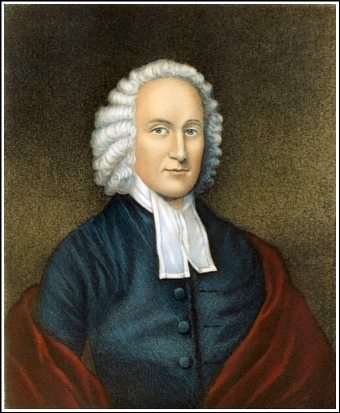CHURCH HISTORY
Church Foundations
Jonathan Edwards
By Brandon Markette

With that background, it is really no surprise that Edwards entered Yale in 1716 to study and prepare for the ministry. Upon graduating, Edwards continued his studies and, in 1722, served as the Pastor of a New York Presbyterian church. This initial foray into ministry lasted only eight months, after which Edwards returned to Yale as a tutor. His next Pastoral role would be as the assistant to his grandfather, Solomon Stoddard, at the church in Northampton, Massachusetts.
Rev. Stoddard had arrived in Northampton in 1672. He pastored his church for the next 57 years, growing in stature among the area clergy. In fact, his influence grew to the point that some took to calling him "Pope of Connecticut River Valley." By 1726, the aging Stoddard determined that he needed an assistant to help him in the ministry. The congregation agreed that Jonathan Edwards would be ideal and called him to the role. Edwards served at his grandfather's side for two years before Stoddard passed away. Northampton then asked Edwards to take over the pulpit. Of course Edwards accepted their call, and for the next 21 years experienced all of the highs and lows a Pastor may experience.
When 1734 arrived, it brought what may have been the highest of those highs. For six months of that year, Northampton experienced a powerful spiritual revival, with men and women coming to faith in droves. As the power of that revival faded, Edwards worked diligently to rekindle the flame, but it was not to be. In the wake of the unexpected revival, Edwards wrote a careful history entitled A Faithful Narrative of the Surprising Work of God. Others received this narrative with both uncertainty and amazement. Despite the transportation limitations of the day, the book became popular in England, as well as the Colonies. In England it was read by the man God would use to restart that surprising work, George Whitfield.
Edwards' greatest legacy is his clear, powerful and well-argued writings. Nearly 300 years later, many of his sermons and books are still read and studied by scholars, pastors, and laymen alike. His sermon "Sinners in the Hands of an Angry God" has been called the most famous sermon in American history!
As Edwards' ample writing reveals, he was a man given to reflection. Edwards commonly took solo walks and rides through the forests around Northampton as he contemplated Scripture and doctrine. Like many other great thinkers, he was also an inveterate note-taker, scribbling notes on any available paper — even between the lines of the newspaper! Returning from his walks, it was not out of the ordinary for Jonathan to be covered in little scraps of paper. As he would write down his thoughts on these walks, he would pin the scraps of paper to himself, in order that he would not lose any!
When George Whitfield came to the Americas in 1740, having read Faithful Narrative, he was keen to talk with Edwards. Whitfield's trip to America was met with a much larger revival, one not limited to the town of Northampton. The Great Awakening was fueled by Whitfield's powerful preaching. Much like the earlier revival in Northampton, the great awakening saw droves of men, women, and children repenting from sin and embracing the gospel of Jesus Christ. These conversions were also marked by many ecstatic experiences. These rather emotional conversions caused many clergy to be leery of the new converts.
Edwards, however, wanted to be sure. At Yale he'd come to believe that real faith is accompanied by a change in our affections. Yet, he also recognized the danger of emotionalism. Relying on his gift of reflection, Edwards examined Scripture and the conversions taking place. He sought to discern a means of distinguishing between authentic conversions and mere emotionalism. The result of his study is one of Edwards' most famous works, A Treatise Concerning the Religious Affections. In this book, he argues that ecstatic experiences mean nothing, either way. They may be a work of God or they may not be. The distinguishing mark of authentic conversion is a life transformed by the gospel. In making this argument, he set forth biblical evidence to evaluate the validity of the revival.
Having experienced the mountaintops of ministry, Edwards began the descent into the deepest of valleys in 1748. A disagreement arose between Edwards and the Northampton church over the practice of communion. Based in large part upon his study of conversion, Edwards felt he must do more to make sure those celebrating the Lord's Supper were, in fact, converts. The congregation disagreed and, in 1950, the disagreement cost Edwards his pulpit. Thus did 21 years of ministry in Northampton end, leaving Jonathan Edwards to ponder the next chapter of his life.
That next chapter began on the frontier (Western Massachusetts in those days) in 1751. A small church in Stockbridge, MA, called Edwards to be their pastor. There, Edwards pastored, wrote, and engaged in missionary efforts among the Housatonic Indians. Edwards produced some of his greatest works, such as "Freedom of the Will" during this time. As these writings circulated, Edwards' reputation for clear, powerful thinking grew, eventually leading to an offer to serve as the President of the College of New Jersey, now called Princeton.
In 1758, despite his initial misgivings, Edwards accepted this post and went ahead of his family to prepare for their move. Sadly, this move also marked the final chapter in Edwards' life. Vaccination against disease was still in its infancy. That year a vaccine against small pox was being administered. Wanting to lead by example, Edwards volunteered to be vaccinated. The vaccination infected Edwards with small pox and, on 23 February 1758, Jonathan Edwards died. Though his time on this Earth was done, the impact of his legacy continues.
Tags: Biblical-Truth | History-Apologetics | Reviews-Critiques | Theological-Beliefs
comments powered by Disqus
Published 2-26-2014

